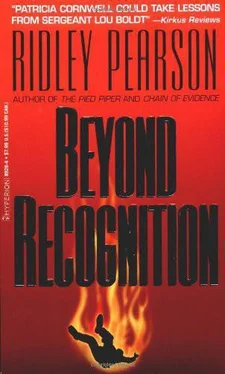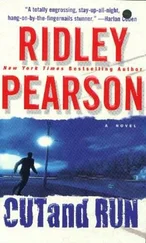Ridley Pearson - Beyond Recognition
Здесь есть возможность читать онлайн «Ridley Pearson - Beyond Recognition» весь текст электронной книги совершенно бесплатно (целиком полную версию без сокращений). В некоторых случаях можно слушать аудио, скачать через торрент в формате fb2 и присутствует краткое содержание. Жанр: Триллер, на английском языке. Описание произведения, (предисловие) а так же отзывы посетителей доступны на портале библиотеки ЛибКат.
- Название:Beyond Recognition
- Автор:
- Жанр:
- Год:неизвестен
- ISBN:нет данных
- Рейтинг книги:5 / 5. Голосов: 1
-
Избранное:Добавить в избранное
- Отзывы:
-
Ваша оценка:
- 100
- 1
- 2
- 3
- 4
- 5
Beyond Recognition: краткое содержание, описание и аннотация
Предлагаем к чтению аннотацию, описание, краткое содержание или предисловие (зависит от того, что написал сам автор книги «Beyond Recognition»). Если вы не нашли необходимую информацию о книге — напишите в комментариях, мы постараемся отыскать её.
Beyond Recognition — читать онлайн бесплатно полную книгу (весь текст) целиком
Ниже представлен текст книги, разбитый по страницам. Система сохранения места последней прочитанной страницы, позволяет с удобством читать онлайн бесплатно книгу «Beyond Recognition», без необходимости каждый раз заново искать на чём Вы остановились. Поставьте закладку, и сможете в любой момент перейти на страницу, на которой закончили чтение.
Интервал:
Закладка:
He was glad she mentioned dinner, because it meant he didn’t have to think about going there . Jack would leave for the bar by seven; it would be safe to go back then. If he was lucky, Emily would ask him to sleep over. She let him do this about twice a week. Not once had Jack asked him about where he went or where he stayed-his only complaint would be if a chore didn’t get done, and those complaints were often of the physical variety, so Ben kept up on the chores.
“It’s even better as a leftover,” she promised. She drank pink wine that she poured from a paper box in the fridge. After lunch they did the dishes together. Emily put on some more lipstick and said she was going outside to “feed the cat.” The cat would have been more correctly named Marlboro, but she pretended Ben didn’t know this.
She made Ben read to her as she sat in her favorite chair, and she fell asleep with a smile on her face. The nap lasted about twenty minutes, at which point Ben heard a car pull in the driveway.
“Another one,” he said, gently shaking her by the upper arm. She was softer than anything, anyone, he had ever touched. She was magical. Special. He’d seen her know things that no one could ever possibly know. It didn’t happen all the time, but when it did there was no explaining it. She had a power. “A gift,” she called it. But it was more than that. It was a vision, an ability to see ahead, like a dream but real. Magic.
“A gal’s got to earn a living,” she said, coming out of the chair and stroking the wrinkles out of her clothes. She patted Ben on the head affectionately. “Your reading’s getting better,” she said. “You might work out after all,” she teased. “I might keep you yet.”
Ben waited for the car to pull up and the engine to go quiet. Then he slipped out back, prepared to do his job.
4
“Would you like a cup of coffee?”
The young kid turned red in the face and corrected himself. “Tea?”
“No, thanks.” Lou Boldt, embarrassed by the offer, felt sorry for the young patrolman. He had been put up to this by someone-probably John LaMoia, who was constantly working the rookies-breaking them in, he called it. Boldt, senior homicide sergeant, was often singled out as the target of such errand running. There was no obligation for a rookie to play the role of a personal servant. Boldt’s tolerance level for LaMoia’s rites of initiation was far above that of Lieutenant Phil Shoswitz, whose nervous disposition and bug eyes resembled a miniature pinscher. If you knew what was good for you, you left Shoswitz in his glassed-in office.
Boldt could think of several ways to turn this stunt back around on LaMoia, but it would mean using this rookie as the go-between, and that seemed manipulative and unfair. “I’m fine,” Boldt told the kid. “Thanks anyway.”
He remembered what it was like to be in uniform and on the fifth floor for the first time: the pounding heart, the prickling skin. Homicide was viewed by most rookies as the top-the pinnacle of a career. Boldt thought back to those feelings and wondered how such myths were started. It was true that homicide dealt with life and death, as opposed to traffic tickets or jaywalkers, but that came with a price of insomnia, guilt, and frustration. Homicide was no cakewalk.
The forty-two-year-old man sitting in the chair today-graying hair cut close to his scalp, his rounding face reflecting the thirty pounds he couldn’t shake, the fingers of his thick hands gnarled from broken knuckles of decades past-was a far cry from the fit, bright-eyed, enthusiastic rookie who had once been tricked into using the chief’s private toilet, a liberty that had cost him two months of walking a beat in the International District.
He could no longer see the Space Needle from the Public Safety Building’s fifth floor. Real estate development in the eighties had taken care of that. It had also choked the roads and interstates, crowded the ferries, and sent real estate appraisals soaring right along with the crime rate. Other than that, newcomers were welcome in Seattle, as far as Boldt was concerned.
He was feeling tired. Miles, his three-year-old son, and Sarah, his eight-month-old beauty named after Sarah Vaughan, had taken turns complaining through the night, leaving both him and Liz exhausted and in foul moods. When Liz got tired, Boldt steered clear, if possible, but a morning encounter in the kitchen-which had something to do with the yolk of a soft-boiled egg not being right-had erupted into a tirade about how Boldt was allowing himself to be absorbed by the job again, an unfair charge in his opinion, given that he had beaten her home four of the last five nights. Commercial banking was definitely more time-consuming than police work. He had said something like that to her, which did not score big points, except on the Richter scale. At the moment he was suffering through a dull headache.
He carried that headache with him to the medical examiner’s office in the basement of Harborview Medical Center, where Dr. Ronald Dixon awaited him.
Harborview, perennially under construction, sat atop Pill Hill with a sweeping view of Elliott Bay and the Port Authority’s towering cranes, feeding and unloading the container ships. Parking anywhere near Harborview was impossible. Boldt took one of two open spots reserved for the ME and placed his OFFICIAL POLICE BUSINESS card on the dash. The September air was in the high 60s. Boldt squinted under the glare of sunshine. A college coed wearing a bikini top sped through the Alder-Broadway intersection on a pair of inline skates. A few of the construction workers stopped to take notice. She wore blue jean shorts with holes in them. To Boldt, she looked too young to be in college.
Dixie’s round face looked Asian in certain expressions, his eyes wide-set, his nose flattened by a college intramural football game. There was a look of intelligence in his eyes. One sensed a formidable presence, a busy mind, just looking at the man. He came out from behind his desk and sat at a small conference table, using a jeweler’s screwdriver to clean his impeccably clean nails. He grimaced a smile at Boldt and indicated a plastic evidence bag left on the table.
On the wall was a framed poster for a performance of Shakespeare’s Two Gentlemen of Verona by the Seattle Repertory Theater and a black-and-white time exposure showing lightning strikes hitting the Space Needle at night. Boldt always found himself mesmerized by that photo, by the power of nature. There was also a pair of pen-and-inks of western subjects-horses and cabins-that reminded Boldt of Zane Grey.
Boldt examined the contents of the bag, a blackened bone three inches by three inches. Dixie said, “From that fire the other night.” Several days had passed since the Dorothy Enwright arson. Until that moment, Boldt had not known which of his squad’s cases were involved. He took a deep breath and reminded himself that he had a lot to learn about fires.
“Is this all?” the sergeant asked.
“All that’s worth anything,” Dixie replied, working the screwdriver under his thumbnail. “It’s fairly common in burns for the spine and pelvis to go last. That’s a piece of the pelvic bone. Pelvis gives us sex. Spine gives us age. Do you see the calcification on the inside edge?” he asked. Boldt pointed. “Right. That indicates some aging. This wasn’t a teenager. Probably wasn’t even in her twenties.”
“Her?” Boldt inquired, his own spine tingling. He had yet to see any paperwork confirming Witt’s mention of an eyewitness.
“What we can tell you is that it was most probably a female. Beyond that, I’m afraid ….” His voice trailed off. “We sifted the site thoroughly. So did Marshal Five and the other inspectors who helped him out. I would have expected to see more than this,” he admitted, sensing correctly that it was to have been Boldt’s next question. “Fingers, toes, ankles, wrists, they can go pretty quickly.” He made it sound like a grocery list. Boldt held a vision of a woman burning to death. He trusted that eyewitness, paperwork or not. “But the femur, the spine, the pelvis … depending on how she fell, they take awhile to cook, even longer to reduce to ash.”
Читать дальшеИнтервал:
Закладка:
Похожие книги на «Beyond Recognition»
Представляем Вашему вниманию похожие книги на «Beyond Recognition» списком для выбора. Мы отобрали схожую по названию и смыслу литературу в надежде предоставить читателям больше вариантов отыскать новые, интересные, ещё непрочитанные произведения.
Обсуждение, отзывы о книге «Beyond Recognition» и просто собственные мнения читателей. Оставьте ваши комментарии, напишите, что Вы думаете о произведении, его смысле или главных героях. Укажите что конкретно понравилось, а что нет, и почему Вы так считаете.












